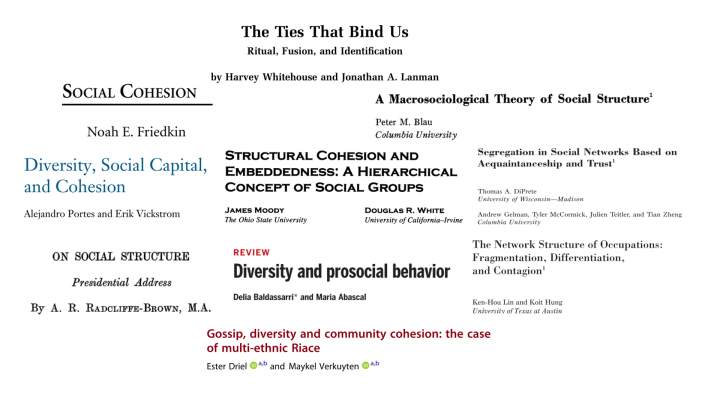The COALESCE Lab has a two-weekly reading group on social cohesion, started and led by Dr. Yunsub Lee. We discuss both classical and state-of-the-art texts on social cohesion from a wide array of perspectives. Given that we are an interdisciplinary group, the reading group gives us a shared theoretical basis.
October 20th, 2022
We started with two reviews of social cohesion from the Annual Review of Sociology, a classic by Noah Friedkin (2004) and a more recent one by Tom van der Meer and Jochem Tolsma (2014). Dr. Yunsub Lee led the discussion.
November 3rd, 2022
We then moved on to Peter Blau's macro-level theory of social structure (AJS, 1977) and a modern-day application of the concept of Blau space by Miller McPherson and Jeffrey Smith (Socius, 2019). Nigel van Herwijnen led the discussion.
November 16th, 2022
Next up were the equally classic paper on structural cohesion by James Moody and Douglas White (ASR, 2003) and, how could we not, Mark Granovetter's "The Strength of Weak Ties" (AJS, 1973) in week 3. Granovetter´s paper has beaten records of citations in the social sciences. Zhiyi Jin was the discussion leader.
December 7th, 2022
In December, we discussed social boundaries with Ellis Monk's exciting new paper on inequality without groups (Sociological Theory, 2022), together with the late Charles Tilly's "Social Boundary Mechanisms" (2004). Nuria Targarona Rifà led the discussion. Together with other works such as "A plea for the de-migranticization of research on migration" by Janine Dahinden, Monk´s paper was influential in Núria´s inductive approach to understand how people categorize the others they relate with.
January 14th, 2023
We discussed two papers on homophily and diffusion, namely Kossinets and Watts' "Origins of homophily in an evolving social network" (AJS 2009) and Damon Centola´s "The social origins of networks and diffusion" (AJS 2015). Alexi Quintana Mathé introduced the papers and led the discussion.
January 26th, 2023
We focused on polarization this day, with the paper "Dynamics of Political Polarization" (ASR 2007) by Delia Baldassarri and Peter Bearman and the paper "The origins and consequences of affective polarization in the United States" (Annual Review of Political Science 2019) by Shanto Iyengar and colleagues. Alejandro Ciordia moderated the discussion.
February 13th, 2023
This session was focused on the measurement of social capital, with two papers, Nan Lin's classical "Building a network theory of social capital" (1999) and a recent, mind-blowing paper by Raj Chetty et al., "Social capital I: measurement and associations with economic mobility" (2022). Additional suggested readings were Steve Borgatti et al.'s "Network measures of social capital" and Paul DiMaggio and Filiz Garip's "How network externalities can exacerbate intergroup inequality". Zhiyi Jin moderated the discussion.
March 14th, 2023
Today we discussed two articles on Randall Collins' theory of ritual interaction chains, which influences Yunsub Lee´s approach to social cohesion: "On the microfoundations of macrosociology" (1981) and "C-Escalation and
D-Escalation: A Theory of the Time-Dynamics of Conflict" (2012). Yunsub Lee moderated the discussion. As Yunsub explained, the theory is based on the classic idea of ritual chains discussed by Goffman at the micro-level, but by adding the concept "chains", he develops it to be able to explain the micro-macro mechanism of social cohesion.
April 11th, 2023
Guest researcher Sophie de Lede moderated the discussion today on two social-psychological papers on identity and tolerance: Hogg's (2023) "Walls between groups: Self‐uncertainty, social identity, and intergroup leadership" published at the Journal of Social Issues, and Verkuyten, Yogeeswaran, and Adelman's (2020) "The Negative Implications of Being Tolerated: Tolerance From the Target’s Perspective" published at the Perspectives on Psychological Science.
May 10th, 2023
On May 10th we covered the topic of social exchange and cohesion, with two theoretical papers by Lawler, Thye, and Yoon (2008), "Social exchange and micro social order", published in the American Sociological Review, and Molm, Collett, & Schaefer (2007)'s "Building solidarity through generalized exchange: A theory of reciprocity" which was published in the American Journal of Sociology. Exchange theories have origins in anthropology (Levi-Strauss, Mauss, Malinowski...). The papers discuss under what exchange structure (e.g., negotiation; unequal exchange power) the participants can have certain psychological features (e.g., positive emotion; trust) that leads them to choose cohesive actions (e.g., maintaining exchange partners; gift giving). Yunsub Lee moderated the discussion.
May 23rd, 2023
Today we discussed two anthropological papers related to our project, "Variability in the organization and size of hunter-gatherer groups: Foragers do not live in small-scale societies" (2019) by Douglas Bird, Rebeca Bliege Bird, Brian Codding and David Zeanah, published in the Journal of Human Evolution. The paper suggests, as the title says, that humans never truly lived in "little boxes", but always had extensive acquaintanceship networks beyond their own groups. Afterward, we discussed a theoretical paper on the role of rituals in social cohesion, "The ties that bind us: Ritual, fusion, and identification" (2014) of fellow ERC Advanced Grant holder Harvey Whitehouse and coauthor Jonathan Lanham published in Current Anthropology. Harvey Whitehouse is also the author of the book "The ritual animal: Imitation and cohesion in the evolution of social complexity" (Oxford University Press, 2021), which we strongly recommend. Miranda Lubbers moderated the discussion.


